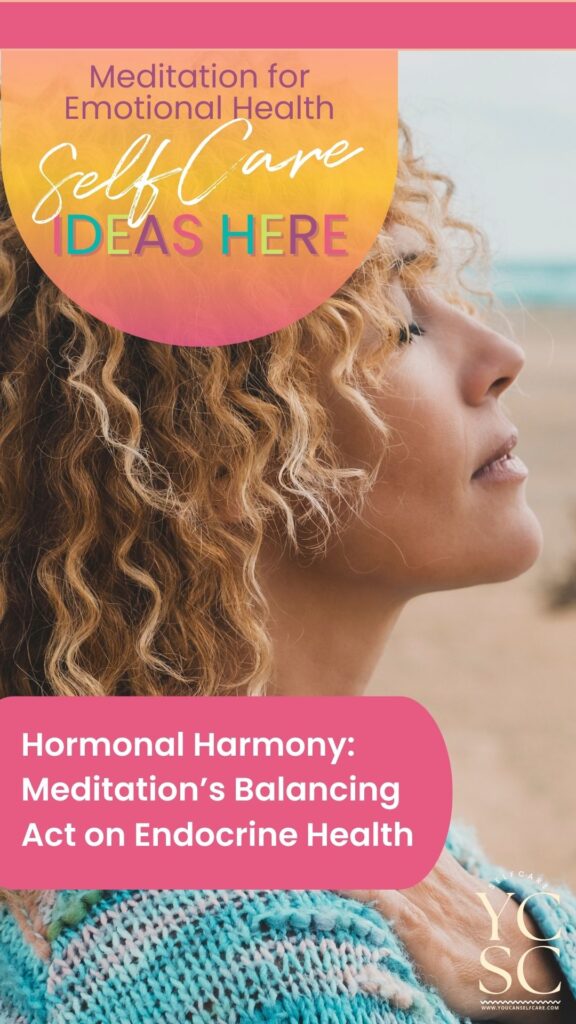Hormonal Harmony: Meditation’s Balancing Act on Endocrine Health
Understanding this connection isn't just about personal wellness, it could reshape healthcare policies, too.
Let's dive into the science behind this fascinating link, explore its potential impact, and see what's still left for researchers to discover.
Welcome to the intriguing world of hormonal harmony through meditation.
Unveiling the Role of Meditation in Balancing Hormones
You'll find it fascinating how meditation is crucial in balancing your hormones, particularly those related to stress, like the Hypothalamic-Pituitary-Adrenal (HPA) axis.
When stressed, your body pumps out cortisol, which can wreak havoc when levels are too high. Meditation helps regulate the role of cortisol, dialing it down to healthier levels.
But it's not just the HPA axis; meditation and thyroid function are also linked. Regular meditation can help correct hormonal imbalances, including those that affect your thyroid.
The outcome? Improved mood, better stress response, and a general sense of well-being. So, it's not an exaggeration to say that meditation and hormone regulation go hand in hand. It's a simple, natural way to help keep your body in balance.
The Science Behind Stress Reduction: Meditation's Impact on Endocrine Health
Understanding the science behind stress reduction, you'll find that mindful practices like meditation can significantly impact your body's hormone production and regulation. The physiological mechanisms at play involve your body's stress hormone, cortisol. Regular meditation helps in the role of cortisol management, reducing its levels and thereby alleviating stress.
This practice also influences thyroid regulation, leading to better mental health. It's worth noting that meditation has notable effects on blood pressure, thanks to its impact on the hormone systems that regulate body fluids and blood pressure.
The impact on mental health is significant, as lower stress levels contribute to improved mental well-being. So, investing time in mindfulness exercises isn't just relaxing; it's a scientifically grounded method of promoting hormonal equilibrium and overall health.
Exploring the Rise of Meditation in Modern Society
In today's fast-paced society, you're seeing more and more people turning to mindful practices as a form of self-care and stress management.
Meditation's popularity in modern lifestyles is skyrocketing due to its cultural influence and scientifically proven impact on well-being. It's not just a trend; research shows meditation's role in stress management by regulating stress hormones.
It's not all about the mind but your body, too. Meditation's effect on hormone regulation can balance your endocrine system, aiding overall health.
This growing practice isn't just about achieving inner peace; it's a potent tool to handle the stressors of everyday life. So, consider incorporating meditation into your routine.
It's time to harness its benefits for your physical and mental health.
How Understanding Meditation-Endocrine Connection Can Shape Healthcare Policies
Grasping the link between mindful practices and your body's hormone regulation could significantly reshape future healthcare strategies.
You see, meditation interventions can have a profound impact on endocrine disorders. They can potentially alter the course of these conditions by regulating hormone levels. Understanding this mechanism is crucial for any policy implications.
It could lead to developing healthcare strategies that integrate meditation as a treatment option for patients with endocrine disorders. The public health impact of such a move could be immense, potentially reducing the burden of these conditions on healthcare systems.
However, more research is needed to fully understand the meditation-endocrine connection and its potential benefits. So, you might just be witnessing a game-changing moment in healthcare policymaking.
The Uncharted Territory: Future Research Directions in Meditation and Endocrine Health
You'll find that there's still much to discover in the realm of how mindfulness practices may influence your body's hormonal systems. Unexplored avenues beckon researchers to delve deeper into the neurological implications of meditation.
Studies must also focus on specific populations since the impact may vary based on age, health status, or lifestyle. Gaining a comprehensive understanding of this field promises to revolutionize how we perceive and manage stress and mental health.
It's crucial to identify the mechanisms of influence at play here. Are they purely physiological, or do psychological factors also play a part? Answering these questions could open new possibilities for enhancing mental well-being and overall health.
Continue to watch this space as science unravels these intriguing connections.
Conclusion
So, it's clear that meditation could hold the key to balancing our hormonal health. Reducing stress hormones helps us manage mental health issues more effectively.
As we further explore the meditation-endocrine connection, we could revolutionize healthcare policies. There's still much to learn, but the potential is inspiring.
Other Sources:
Hormonal Harmony: Exploring Endocrinology and Hormone Balance
Like a finely-oiled machine: Self-help and the elusive goal of hormone balance
Hormone Harmony in Metabolic Disorders
Effects of Yogic Practices and Vedic Meditation on Physiological Parameters
Meditation, health and scientific investigations: review of the literature
A Balancing Act: The Development of Energize! A Holistic Approach to Acting
Balance Your Hormones, Balance Your Life: Achieving Optimal Health and Wellness Through Ayurveda, Chinese Medicine, and Western Science
Get Your Free Printable Guide, "Transform Your Self-Care Routine in 7 Days," and Unlock the Secrets of Health and Happiness. Click Here
Hi! Are you ready for some 'Me-Time'?













